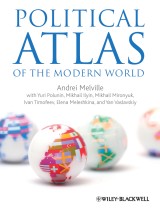Details

Political Atlas of the Modern World
An Experiment in Multidimensional Statistical Analysis of the Political Systems of Modern States1. Aufl.
|
119,99 € |
|
| Verlag: | Wiley-Blackwell |
| Format: | EPUB |
| Veröffentl.: | 02.08.2011 |
| ISBN/EAN: | 9781444351958 |
| Sprache: | englisch |
| Anzahl Seiten: | 256 |
DRM-geschütztes eBook, Sie benötigen z.B. Adobe Digital Editions und eine Adobe ID zum Lesen.
Beschreibungen
<i>The Political Atlas of the Modern World</i> is a unique reference source which addresses these questions by providing a comparative study of the political systems of all 192 countries of the world. <ul> <li>Uses quantitative data and multidimensional statistical analysis</li> <li>Ranks countries according to five indices of political development: stateness, external and internal threats, potential of international influence, quality of life, institutional basis of democracy</li> <li>Illustrated throughout with tables and diagrams.</li> </ul>
Acknowledgments. <p><b>Introduction.</b></p> <p><b>1. Theoretical and Methodological Grounds of the Project.</b></p> <p>1.1 Comparative Analysis Methods.</p> <p>1.2 Methods of Multidimensional Statistical Analysis.</p> <p>1.3 Overview of Precedents.</p> <p><b>2. Indices: Rationale and Structure.</b></p> <p>2.1 Stateness Index.</p> <p>2.2 External and Internal Threats Index.</p> <p>2.3 Index of Potential of International Influence.</p> <p>2.4 Quality of Life Index.</p> <p>2.5 Index of Institutional Basis of Democracy.</p> <p><b>3. Country Ratings.</b></p> <p>3.1 Countries Rated by the Stateness Index.</p> <p>3.2 Countries Rated by the External and Internal Threats Index.</p> <p>3.3 Countries Rated by the Index of Potential of International Influence.</p> <p>3.4 Countries Rated by the Quality of Life Index.</p> <p>3.5 Countries Rated by the Index of Institutional Basis of Democracy.</p> <p>3.6 Correlations Between the Indices.</p> <p>3.7 Correlation Between the Institutional Basis of Democracy Index and Democracy Indices of Other Projects.</p> <p><b>4. Countries Classified by Principal Components Method and Cluster Analysis.</b></p> <p>4.1 Countries Classified by the Principal Components Method.</p> <p>4.2 Countries Classified by Cluster Analysis.</p> <p><b>5. From Universal Comparisons to Country Profiles.</b></p> <p>5.1 The United States in Multidimensional Classifications.</p> <p>5.2 The United Kingdom in Multidimensional Classifications.</p> <p>5.3 Germany in Multidimensional Classifications.</p> <p>5.4 France in Multidimensional Classifications.</p> <p>5.5 Japan in Multidimensional Classifications.</p> <p>5.6 China in Multidimensional Classifications.</p> <p>5.7 India in Multidimensional Classifications.</p> <p>5.8 Brazil in Multidimensional Classifications.</p> <p>5.9 North Korea in Multidimensional Classifications.</p> <p>5.10 Myanmar in Multidimensional Classifications.</p> <p>5.11 Russia and Other Post-Communist States in Multidimensional Classifications.</p> <p>Conclusion.</p> <p>Index of Countries.</p> <p>Index of Names.</p>
<p>“While only a statistician could properly evaluate the authors’methodology, they have compiled a book which will well deserve the attention of the world’s political scientists and global strategists.” (<i>Reference Reviews Journal</i>, 2011)</p> <p> </p>
<b>Andrei Melville</b> is Professor of Political Science at State University - Higher School of Economics in Moscow <p><b>Yuri Polunin</b> is Chief Analyst of the “Expert” magazine and Professor of Comparative Politics at MGIMO-University, Moscow</p> <p><b>Mikhail Ilyin</b> is Professor of Comparative Politics at MGIMO-University, Moscow</p> <p><b>Mikhail Mironyuk</b> is Associate Professor of Comparative Politics at MGIMO-University and Associate Professor of Polititcal Science at State University – Higher School of Economics, Moscow</p> <p><b>Ivan Timofeev</b> is Associate Professor of Political Theory at MGIMO-University, Moscow</p> <p><b>Elena Meleshkina</b> is Professor of Political Science at the Institute of Scientific Information for Social Sciences of the Russian Academy of Sciences</p> <p><b>Yan Vaslavskiy</b> is Assistant Professor of Political Theory at MGIMO-University, Moscow</p>
How can we compare political systems in contemporary world politics? What measures can we use to understand the political development of countries whose histories and cultures make them so different? <i>The Political Atlas of the Modern World</i> is a unique reference source which addresses these questions by providing a comparative study of the political systems of all 192 countries of the world. <p>Using quantitative data and multidimensional statistical analysis, the <i>Atlas</i> ranks countries according to five indices of political development:</p> <ul> <li>stateness</li> <li>external and internal threats</li> <li>potential of international influence</li> <li>quality of life</li> <li>institutional basis of democracy.</li> </ul> <p>Illustrated throughout with tables and diagrams, the book describes the methodological tools used and the key research findings. This innovative research project was initiated and sponsored by the Institute for Public Projects (Moscow) and supported by MGIMO-University.</p>
"Recognizing the need for more a more nuanced approach to cross-national comparison, the authors of <i>A Political Atlas of the Modern World</i> have developed a multidimensional classification that encompasses and enhances existing tools. By combining critical concepts in comparative politics and international relations, the <i>Atlas</i> serves as a valuable reference for scholars and practitioners, as well as a remarkable tool for students to evaluate global politics and better understand methods of political research."<br /> —<b>Erik Herron</b>, University of Kansas <p>"This volume provides one of the most ambitious attempts at classifying political systems across the world, based upon existing empirical data. The volume not only critically assesses existing data sets but tries to tap into the data to provide a series of rankings that might be used by comparative political scientists. This will be a very useful source for years to come."<br /> —<b>John Ishiyama</b>, University of North Texas</p>

















